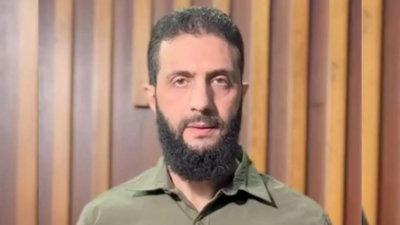
For years, Abu Mohammed al-Jolani was known as a shadowy figure leading Syria’s branch of Al-Qaeda. As the founder of the Al-Nusra Front (ANF), his group was synonymous with extremist ideology, brutal tactics, and a global terrorist entity by the United States in 2013. Yet today, Jolani is crafting a dramatically different image, one that positions him as a pragmatic leader of Syria’s rebel stronghold.
Born Ahmed al-Sharaa in Damascus in 1982, Jolani’s roots are far removed from the jihadist persona he later cultivated. Raised in Mazzeh, a wealthy district of the Syrian capital, he excelled academically and came from a privileged background. However, the post-9/11 era proved a turning point.
Drawn to jihadist ideology, he joined Al-Qaeda in Iraq, eventually crossing paths with its infamous leader, Abu Musab al-Zarqawi.
In 2011, as Syria’s Arab Spring protests evolved into civil war, Jolani returned to his homeland, founding the Al-Nusra Front. Under his leadership, the group pledged allegiance to Al-Qaeda, becoming one of the most dangerous factions in Syria’s fragmented conflict. However, Jolani’s alignment with Al-Qaeda began to wane.
In 2016, he announced that his group was breaking away from Al-Qaeda, rebranding the group as Jabhat Fath Al-Sham and later Hayat Tahrir al-Sham (HTS).
From extremist to politician
This shift marked the beginning of Jolani’s attempt to soften his image. While Western governments still classify HTS as a terrorist organization, Jolani has taken steps to project himself as a more moderate figure.
The turban of his militant past has been replaced with military fatigues or simple khakis. His rhetoric has shifted from fiery jihadist speeches to political pragmatism.
In an effort to position HTS as a legitimate governing force in rebel-held Idlib, Jolani oversaw the establishment of a civilian administration, creating a semblance of governance in the war-torn province. He has also sought to allay fears among minority communities, addressing Christians in Aleppo with promises of safety and security under HTS rule.
His appearance on CNN earlier this year marked a definitive moment in his rebranding journey. Jolani spoke of personal evolution, saying, “A person in their twenties will have a different personality than someone in their thirties or forties. This is human nature.”
Many, however, view this transformation with suspicion, arguing it is a calculated attempt to secure international legitimacy.
A ‘pragmatic’ radical
Jolani’s leadership remains polarizing. While he has distanced himself from Al-Qaeda and its global ambitions, HTS continues to face accusations of human rights abuses in its territories. Many have described Jolani as a “pragmatic radical” who adapts to the changing dynamics of Syria’s conflict.
The offensive, which began with the surprise capture of northern Aleppo, has quickly turned into a series of stunning victories for the rebels. Cities fell in rapid succession as Assad’s forces failed to hold their ground. The strategic capture of Homs severed Damascus from the Alawite-dominated coastal region, where Assad’s Russian allies maintain critical air and naval bases.
Rebels staged a sudden advance, seizing the Syrian capital Damascus and ending Bashar al-Assad’s 24-year reign.






